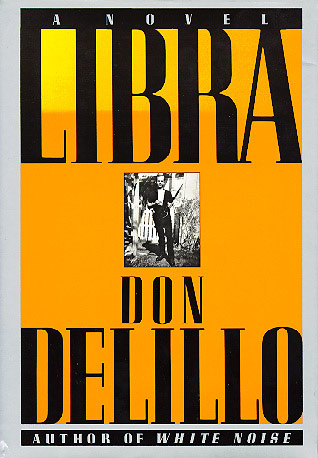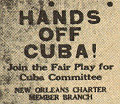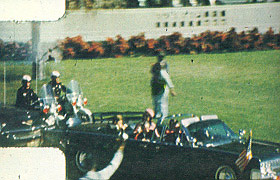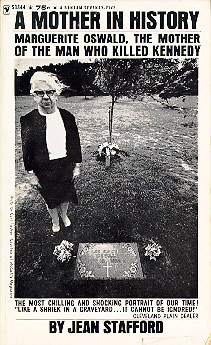
A novel by Don DeLillo

Published by Viking, 1988, 456 pages. Jacket design by Neil
Stuart.
Paperback issued by Penguin, 1989.
Libra editions.
The 2006 Penguin editions of Libra (printing 22) include
a new five page introduction by DeLillo, entitled "Assassination
Aura." There are five numbered sections that discuss reverberations
of the assassination, such as the 1975 Ant Farm recreation in
Dealey Plaza ("The Eternal Frame"), along with new efforts
to scientifically determine the number of shots from a dictaphone
recording made that day.
Dedication: "to the boys at 607: Tony, Dick and Ron" (see the entry in Underworld Pt. 6 that relates to this dedication; I suspect they are cousins/friends from the early days in the Bronx)
The book that baseball fan George Will called "an act of literary vandalism and bad citizenship."(!?) Washington Post, Sept. 22, 1988.
"Will also said I blamed America for Lee Harvey Oswald. But I don't blame America for Lee Harvey Oswald, I blame America for George Will" --DeLillo to David Remnick, 1997.
What it's about:
A "work of imagination" which deals with Lee Harvey
Oswald and the assasination of John F. Kennedy.

Here's the original dust jacket copy.
First line:
"This was the year he rode the subway to the ends of the
city, two hundred miles of track."
What it's really about:
From DeCurtis: "I don't think Libra is a paranoid
book at all. I thinks it's a clear-sighted, reasonable piece of
work which takes into account the enormous paranoia which has
ensued from the assassination."
"We seek pattern in art that eludes us in natural experience.
This isn't to say that art has to be comforting; obviously, it
can be deeply disturbing. But nothing in Libra can begin
to approach the level of disquiet and dread characterized by the
assassination itself."
Check out the Libra Media Watch for contemporary reviews of the novel.

"Libra was Oswald's sign, and because Libra refers to the scales, it seemed appropriate to a man who harbored contradictions and who could tilt either way."


Added upon hearing of the passing of Norman Mailer on November 10, 2007 at the age of 84. From a New York Times blog entry on Oct. 18 on the initial issue of the Mailer Review.
From a May 1995 letter to Norman Mailer from Don DeLillo, after Mailer had sent him Oswald's Tale:
I don't think Oswald would have walked a block and a half to shoot at Kennedy. The President had to come to him. As to whether there was a second shooter, the force of history right now seems to tend against, but that will change, and then will change again.
We're all stuck with this guy, you and I more than most, and when I look at the cover photo of the Neely Street house I feel an eerie and complex nostalgia for the time when I was following Lee's ghost in Dallas, Fort Worth and New Orleans.
Here is part of Mailer's reply:
... by God, hang around with the KGB long enough and you do get some inkling of how their minds operate ... As for the second shooter, let's discuss that too. My mind is not closed on that either although, as you can see, I lean to Oswald alone.
The full text of a letter from Mailer to DeLillo after he read Libra, dated August 25, 1988 as first published in The New Yorker, Oct 6, 2008 issue):
"What a terrific book. I have to tell you that I read it against the grain. I've got an awfully long novel going on the CIA, and of course it overlapped just enough that I kept saying, 'this son of a bitch is playing my music,' but I was impressed, damned impressed, which I very rarely am. I think we keep ourselves writing by allowing the core of our vanity never to be scratched if we can help it, but I didn't get away scot-free this time. Wonderful virtuoso stuff all over the place, and, what is more, I think you're fulfilling the task we've just about all forgotten, which is that we're here to change the American obsessions–those black holes in space–into mantras that we can live with. What you've given us is a comprehensible, believable, vision of what Oswald was like, and what Ruby was like, one that could conceivably have happened. Whether history will find you more wrong than right is hardly to the point: what counts is that you brought life back to a place in our imagination that has been surviving all these years like scorched earth, that is, just about. It's so rare when novel writing offers us this deep purpose and I swear, Don, I salute you for it."